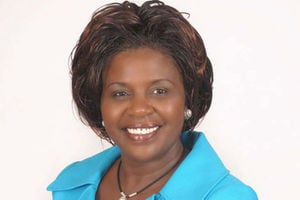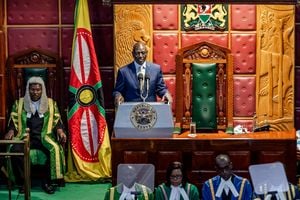
Education Cabinet Secretary George Magoha, then Knec Board chairman, inspects KCSE exam papers at Sawagongo High School in Siaya County on November 13, 2017.
| File | Nation Media GroupEducation
Premium
Court throws out case against Knec merger of exam centres
What you need to know:
- Parents will have to foot additional transport costs amid worries over their children’s safety.
- Knec told the court that the centres’ merger would help improve security and safety of candidates.
Form Four and Standard Eight candidates in marginalised areas will have to walk long distances to sit their national exams in March after the High Court allowed the national examiner to merge centres with less than 30 candidates.
The directive issued by the Kenya National Examination Council (Knec), in a bid to cut costs, is likely to hit hard learners in sparsely populated areas such as Northern, parts of Coast and Eastern Kenya.
Their parents, already reeling from economic hardships caused by Covid-19 pandemic, will have to foot additional transport costs amid worries over their children’s safety.
Knec told the court that the centres’ merger would help improve security and safety of candidates and examiners, address transport challenges, cut rising administration costs and maintaining the integrity of tests.
A citizen, Mr David Wanyeki Kago, had challenged Knec's decision on grounds that there was no public participation and that parents were not engaged before issuance of the directive in July, yet they will be affected.
He was also aggrieved by Kenc’s decision to issue multiple and contradictory circulars between May and July 2021 on the merger.
But judge Anthony Mrima dismissed the petition stating that the petitioner failed to challenge the last circular that was issued in July 2021.
The judge said even if the court quashed the earlier three circulars issued in May and June, still the July circular is sufficient to accord the necessary guidelines on the joint hosting of the exams.
"The July circular was to give fresh instructions on the joint hosting of examination centres. It is a stand-alone communication and it speaks clearly on what the addresses are to do," said the judge.
Registration of candidates
“The circular neither depends on nor is it an extension of the further June circular. This court must, however, state that the position would have been different had the July circular been disputed.”
He reiterated that an order which serves no purpose ought not to be granted and that court should not act in vain.
"Quashing the circulars, in the unique circumstances of this case, will be an exercise in futility. It will yield to nothing as the joint hosting of the examination centres will still be undertaken on the basis of the July Circular. This court declines that invitation," stated Justice Mrima.
Mr Kago wanted court to quash three circulars issued in May and June 2021 by Knec on how it intended to carry out the 2021 national examinations in primary and secondary schools.
The court noted that the circulars were superseded by a further circular dated July 21, 2021.
The July circular clarified the hosting of schools, which did not have a candidature of at least 30 students during the conduct of the 2021 KCPE and KCSE examinations at other examination centres.
The clarification was that the circulars related to hosting and not registration of candidates hence there was no violation of the Knec rules.
According to court papers, the merger was also informed by shortage of police officers in the country, which had prompted Knec to be given back up of the National Youth Service (NYS servicemen) to offer security at tests centres.
The examination centres have been reduced to 15,648 from 31,294.
Knec informed court that the NYS servicemen are not adequately equipped to provide security during examinations thus compromising the security of the entire examination processes.
Reduced examination centres
It stated that the approximate number of police officers in the country is about 100,000. Out of this, Knec required 56,920 armed police officers.
The estimated number of security officers required to offer security in all examination centres during the 2021 national examinations is 60,000 due to rising number of new examination centres occasioned by the increasing candidature.
But with the merging of 12,813 schools into other examination centres, a total of 31,294 security officers (two security personnel per centre) in 15,647 centres will be used.
"Previously Knec had 28,460 examination centres requiring 56,920 security officers. The government is better able to provide security to the 15,647 centres and still have adequate personnel for the other critical police work," it added.
Despite the increasing number of candidates in both primary and secondary schools and examination centres, Knec has for the last three years been receiving a stagnant KCPE and KCSE examinations grants of Sh942 million for KCPE and Sh3 billion for KCSE from the National Treasury through the Ministry of Education.
With the reduced examination centres due to hosting, Knec said fewer personnel will be required to be deployed at the centre because only one centre manager and one supervisor will be required in host centres.
The petitioner was aggrieved by the manner and quick succession in which the Knec issued the circulars to headteachers and principals with contradictory details.
For instance, the circular dated May 18, 2021 provided that any school that had between five and 14 candidates would be hosted by another centre to be determined by the sub-county director of education.
It also provided that schools with less than five candidates were to register their candidates in other approved examination centre in the same sub-county.
Public participation
Later on June 11, 2021 Knec issued another circular directing that all head teachers of primary schools and principals of secondary schools with less than 40 candidates will be hosted by an examination centres with more than 40 candidates during the 2021 KCPE and KCSE exams.
The circular indicated that the host school should be located within the sub county where the hosted schools are.
Both the host school and the hosted school(s) should be served from one distribution point (container).
Soon thereafter, Knec issued yet another circular dated June 28, 2021 indicating that all primary and secondary schools from both public and private with less than 30 candidates will be hosted by centres of their choice during the 2021 KCPE and KCSE examinations.
The petitioner wanted court to declare the circulars null and void for offending the principles of legitimate expectation and legal certainty.
"The circulars are contradictory and are aimed at circumventing the provisions of the Kenya National Examinations Council Act and the Regulations made thereunder. The circulars are also decreed to be in contravention of Articles 10, 43 and 94(6) of the Constitution," said Mr Kago.
Though Justice Mrima dismissed the petition, he concurred with the petitioner's argument that Knec ought to have carried out adequate public participation before making the policy directives contained in the three circulars “in an imperial manner”.
Since the public policy decisions will cause thousands of children to sit their national examinations in different schools from those they have been attending, Mr Kago faulted Knec for not even catering for the logistical difficulties and expenses that will be incurred by the affected parents and the candidates.
The judge said Knec should have subjected the circulars to public participation or stakeholder engagement at the very least before they were arrived at and later offered for implementation.





